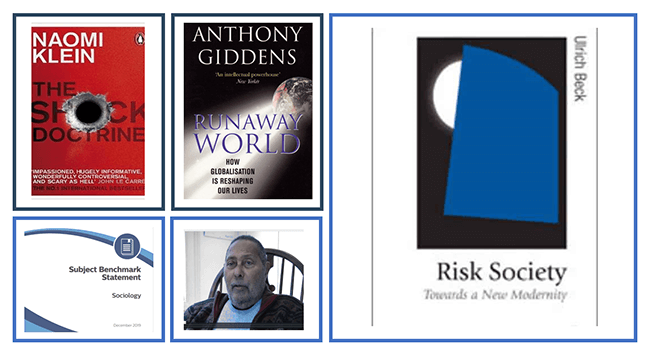Introduction
Is the Covid-19 pandemic a social ‘watershed moment’, or one that mainly accelerates existing trends, or one of temporary or even permanent trend reversal – or perhaps some combination of the above? Is it a ‘wake-up call’ for behaviour and policy change, or mainly entrenching existing positions, institutions and social structures? How, and how significant, will it ultimately appear on the timeline of social change – for example vis-à-vis wars and economic crises, revolutions and decolonisations, the advent of neoliberalism and globalised capitalism, the end of Communism in Europe, dawning of the digital age, 9-11 and Brexit? And what conceptual tools can assist Sociology students in making sense of the pandemic and assessing its significance? I attempt below a brief overview of, and reflection on, some implications of Covid-19 for the Sociology curriculum.
Amongst the most widely-discussed aspects in Discover Society, The European Sociologist, Everyday Society and elsewhere are:
- Society-nature relationships, risks and futures.
- Economy, work and consumption, including globalisation and de-globalisation.
- Race, gender, class, age/inter-generational and other inequalities.
- Emotions, ‘rights’ and ‘responsibilities’, inter-personal relationships and the life course, including childhood, youth, older age, illness and death.
- Crime, including domestic abuse and organised crime.
- Urban life, including homelessness, transport and environmental quality.
Cross-cutting these topics are:
- Social construction of knowledges and discourses, including media representations and ‘expert’ knowledges.
- Social change, including power relationships, political activism, the public sector and public policy.
- Parallel events, including current expressions of national populism and anti-racism.
I focus here on (1), (2) and (3) above, but with reference to (a), (b) and (c) also.
Some Recurring Covid-19 Themes
Analysts commonly evoke a ‘zoonotic’ risk unleashed by humanity’s destructive relationship with the natural world, with mass travel facilitating rapid world-wide transmission of the virus itself and instantaneous global communications begetting a parallel spread of ‘information’: a foreshadowing of ‘things to come’ if warnings from the World Health Organization and elsewhere continue to go unheeded. (i)
The pandemic has also sent profound shock waves through the economy and worlds of work, production and consumption. In the UK and elsewhere, sudden economic contraction is morphing into economic recession and widespread unemployment. Some sectors (including fossil fuel production, aviation, hospitality, ‘bricks and mortar’ retailing and performing arts) will particularly struggle to recover, though others (notably online retailing) will doubtless benefit.
The emerging picture is one of massively unequal impact, given the over-representation of poorer and less well-educated groups, migrants and refugees, sexual minorities, women and girls, people with disabilities, younger generations and those approaching retirement, in disadvantageous education, employment, housing or other situations. The unfolding crisis has particularly intensified debates about precarious work, food and housing insecurities, systemic racism and other discriminations.
Covid-19 has also exposed deeper fragilities in the global economic system, reflected in disrupted supply and (for migrant workers) remittance chains. Shorter supply chains may emerge in some areas: in effect, de-globalisation. However an opportunistic response from big infrastructure and IT corporations may also be expected when economic recovery projects become available. More fundamentally, the crisis has called into question the neoliberal model of unregulated global capitalism and weakened public sphere which have dominated recent politics and policy – and which are widely argued to have undermined local economic autonomy, widened inequalities and wreaked environmental destruction. Ironically, even some of the most neoliberally-minded governments and commentators have embraced interventionist policies – albeit as a short-term exigency for the purpose of ultimately protecting neoliberalism itself. (ii) In contrast, more critical observers are arguing for fundamental changes of direction – including less growth, long-term public involvement in the economy, more progressive taxation, decentralised decision-making, and ‘green new deals’.
Towards a ‘Post-Pandemic’ Sociology Curriculum
Many aspects of life have changed abruptly: production, consumption and travel behaviours, amongst others. But to what extent short-term changes become ‘locked in’ (for example, via public pressure and policy response), and in what possible ways they act, domino-like, to produce wider and deeper transformations, are open to question. And alongside calls for ‘learning the lessons’ and ‘seizing the moment’ are more sceptical voices advising that ‘wishful thinking’ is an insufficient basis for social change. So what key sociological ideas may assist in making sense of this unfolding situation, and how might the curriculum adapt?
In a poignant last interview, Stuart Hall speaks of ‘conjunctural analysis’, as used in Policing the Crisis (1978) to identify the ‘ruptural break’ between “two basic eras: the social democratic Keynesian welfare state moment from the end of the war … until the 1970s, when its disintegration is palpable and it is coming apart at the seams. Then a new paradigm comes into existence: neoliberalism. That has gone through several versions and variants … but I think all of the period between the 1970s and now is part of that”. (iii) However deeply compromised neoliberalism itself may now be, it’s premature to argue that we are at a moment of ruptural break; but conjunctural analysis offers a framework for assessing historically significant events and potential moments of fundamental change.
We might also usefully turn to Anthony Giddens’ and Ulrich Beck’s work on globalisation, ‘reflexive modernity’ and risk. (iv) To summarise:
- Giddens has famously defined globalisation as “the intensification of worldwide social relations that link distant localities in a way that local happenings are shaped by events … occurring many miles away and vice-versa”. (v)
- Giddens also speaks of the “end of nature … [which] refers to the fact that there are few aspects of our surrounding material environment that haven’t been in some way affected by human intervention”. (vi)
- We should distinguish between the fatalism of ‘premodern’ societies, especially vis-à-vis natural hazards; the optimism of ‘industrial modernity’, when science was expected to control natural processes and overcome material shortages; and the anxieties of ‘reflexive modernity’, when “we started worrying less about what nature can do to us, and more about what we have done to nature” (vii) – and which have, in turn, produced ‘manufactured risks’ such as those associated with climate change, antimicrobial resistance, genetic engineering and, of course, zoonotic pandemics. These disparate examples are all anthropogenic, borderless, unprecedented, and future orientated (that is, they provoke concern about how events may unfold). Not everyone buys into these anxieties, of course: discourses of pessimism and optimism co-exist (viii), and there are reasons to question the applicability of this analysis to those whose priority remains the ‘here and now’ of basic needs.

Beck and Giddens also associate reflexive modernity with ideational and, especially, identity-related risks. Giddens’ ‘runaway world’, in particular, is one in which widely held ideas are swept aside by rapid changes associated with globalisation, and of people confronted by unfamiliar cultures and values: liberating for some but unsettling for others. And in an age of cultural and political polarisation, it’s no surprise that pandemic talk (and related action) is frequently refracted through the prism of liberal-democratic cosmopolitanism versus national populism – such that cautious compliance with expert-led prescriptions by some contrasts with the libertarian, anti-expert and ‘business as usual’ stance of others, including of course the US White House. (ix)
Coinciding with, more than cross-cutting, these discourses of optimism versus pessimism, and cosmopolitanism versus populism, is a further polarisation between Keynesian/welfare state interventionism and neoliberal non-interventionism – along with a further distinction between centralised versus de-centralised forms of intervention. Those who, like the UK government, reluctantly concede the necessity for massive economic stimulus, look set to adopt a mainly ‘top-down’ approach – which favours large corporations and projects but probably concedes little in terms of social equalisation: in other words, one that is designed to rebuild, rather than reform, neoliberal capitalism. In The Shock Doctrine, Naomi Klein contrasts centrally-sponsored corporate ‘reconstruction’ in post-invasion Iraq, post-Katrina New Orleans and post-tsunami South-East Asia with instances of community-led reconstruction – for example in Thailand, where “architecture students and professors … volunteered to help community members design their new houses and draw their own rebuilding plans”, rather than acquiescing to eviction and corporate resort development. (x) Klein’s thesis provides a further conceptual frame for examining the current era and likely future scenarios – including the significance of those diverse political activisms which have helped to rebuild areas devastated by environmental disasters; challenged global capitalism’s inequalities and environmental destruction; and risen to recent prominence in the context of #MeToo and #BlackLivesMatter.
Conclusion
These are clearly not new ideas, but they receive only limited attention in the UK’s Subject Benchmark Statement for Sociology – for example, with little or no explicit reference to ‘risks’ and ‘futures’. Prioritising environmental and other issues of current and likely future import, and the modes of analysis outlined here, would arguably confer two benefits. First it would permit more holistic analysis of the neoliberal conjuncture, including its evolution and possible signs of disintegration and ‘rupture’. And second it would point away from a predominantly ‘canonical’ and present-focused (even backward-looking) curriculum – and towards one that more adequately equips students with the tools required to engage with issues of emerging concern, to make sense of the uncertain futures they face, and to position themselves as empowered actors in the current historical moment of change.
Notes and References
(i) See also Quammen, D (2013) Spillover: Animal Infections and the Next Human Pandemic (WW Norton); and Wolfe, N (2012) The Viral Storm: The Dawn of a New Pandemic Age (St Martin’s).
(ii) They have also generated unlikely newspaper headlines, such as in the Daily Telegraph, 20th March 2020: ‘Boris must embrace socialism immediately to save the liberal free market’ (see https://www.telegraph.co.uk/business/2020/03/20/boris-must-become-socialist-face-nationalising-entire-economy/).
(iii) For the full transcript, see Jhally, S (2016) ‘Stuart Hall: the last interview’, Cultural Studies, 30(2), 332-45. http://dx.doi.org/10.1080/09502386.2015.1089918. See also ‘Preface to the Second Edition’ of Policing the Crisis (2013).
(iv) See in particular Beck, U (1992) Risk Society: Towards a New Modernity; and Giddens, A (2002) Runaway World: How Globalisation is Reshaping our Lives (Profile). For transcripts and recordings of the 1999 BBC Reith Lectures, on which Runaway World is based, see http://news.bbc.co.uk/hi/english/static/events/reith_99/.
(v) Giddens, A (1990) The Consequences of Modernity, (Polity), page 64.
(vi) Giddens, Runaway World, page 27.
(vii) Giddens, Runaway World, page 26.
(viii) For contrasting views on genetic engineering, see these two very short videos at https://www.youtube.com/watch?v=1qw_5i9Gbw8 and https://vimeo.com/6614397.
(ix) On cosmopolitanism versus national populism, see Eatwell, R and Goodwin, M (2018) National Populism: The Revolt Against Liberal Democracy (Pelican). And for one of numerous libertarian responses to Covid-19 in the political magazine spiked, see ‘Lockdown fanatics scare me far more than Covid-19’.
(x) Klein, N (2008) The Shock Doctrine: The Rise of Disaster Capitalism (Penguin), page 464. See also her recent article, ‘How big tech plans to profit from the pandemic’ and interview, ‘We must not return to the pre-Covid status quo, only worse’.
Peter Jones is Principal Lecturer in Social Sciences at the University of Greenwich.


